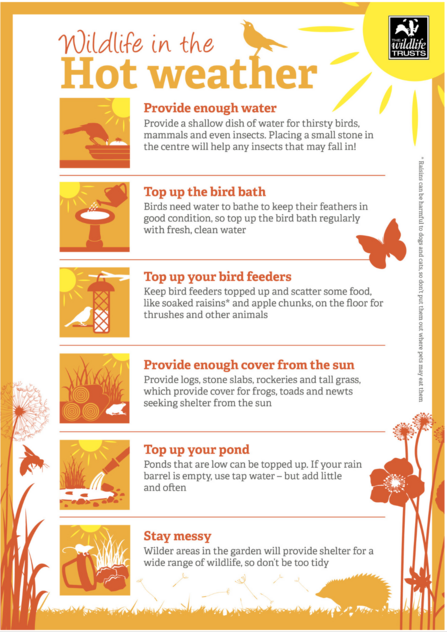Just as people in the UK are not used to sweltering temperatures, our native animals and plants are not adapted to cope with extreme heat or prolonged spells of dry weather. Taking a few small steps can save wild lives in the short term.
After record breaking temperatures and extended dry spells during July, two areas of the country have now imposed hosepipe bans - other parts of the country could soon face similar restrictions, especially our region where conditions are amongst the driest. Most of us have little idea of how much water we use each day - surveys suggest most people hazard a guess of around 20 litres - the true figure is closer to 142. During dry weather excessive use of water has a devastating impact on wildlife. The more water used by households and businesses, the lower water levels in streams and reservoirs fall; the slower rivers flow, the less oxygen there is in the water, and the warmer the water temperature. Algal blooms can appear, choking off other freshwater life.
Wildlife such as hedgehogs, field mice, weasels and stoats struggle to find enough water quench thirst; water voles are more likely to be picked off by birds of prey, because the water they usually use to take cover in has disappeared. Some species are gasping for water, so reducing water use is vital for helping wildlife cope with the drought - water is more than just a place where animals live, it is a food resource, where they get their oxygen and where they shelter and hide.
So, don’t wait for a hosepipe ban to be announced, start saving water:
Garden - don't use hosepipes: leave lawns to crisp up – they bounce back. Water plants in pots and containers with a watering can first thing in the morning or last thing in evening, rather than during the heat of the day when water will evaporate before the plants can absorb it. Longer term consider planting drought-tolerant plants like grasses, rock roses and lavender, etc. Use water butts to collect rainwater – plants much prefer it to tap water, plus it’s free!
Bathroom - turn taps off when brushing teeth, take shorter showers and forget having a bath for the time being. Check water company websites – most are giving out free eco shower heads and bags for toilet cisterns, to reduce the amount of water used for each flush.
Kitchen - only run dishwashers when full, and use all appliances on eco-mode. Use a bowl or jug in the sink to collect water when rinsing fruit and vegetables which can be reused in the garden. Keep a jug of water in the fridge to avoid running the tap for cold water.
More tips from Katie King communities manager and visit our actions page


